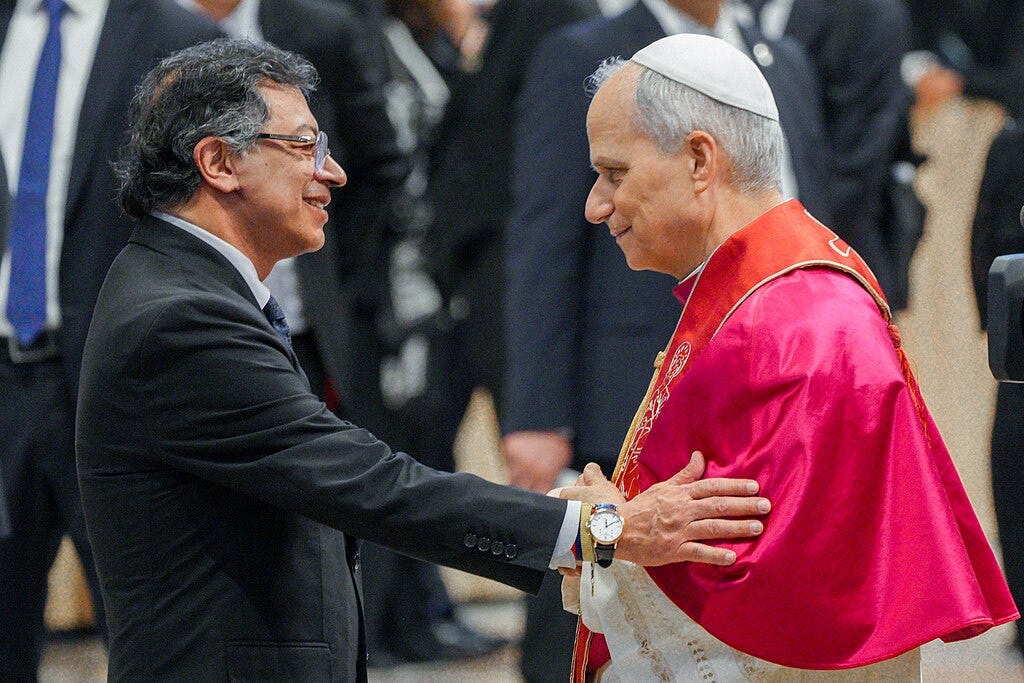On May 17, Pope Leo XIV delivered an address to the Centesimus Annus Pro Pontifice Foundation (FCAPP), a nonprofit organization established by Pope John Paul II in 1993 to promote the Church’s social teaching. Although Leo’s address is short, it provides us some insight into how he thinks about Catholic social doctrine. Perhaps most importantly, he provides a definition of “doctrine” as “the product of research,” and therefore “of hypotheses, discussions, progress and setbacks,” rather than a set of ideas already possessed by the Church. But Leo also identifies some of the global issues he considers most pressing and which he is likely to address in more detail in his teaching in the years to come.
The pope began his address by linking the themes of the FCAPP conference to those he had mentioned as being of particular concern for the Church in his Urbi et Orbi message given shortly after his election as pope. The conference in fact focused on distinct themes over two days. On May 15, the participants discussed the theme of “How Catholic social thought contributes to responsible leadership dialogue and cooperation in a polarized world.” Despite the stated theme, this day’s discussions focused on how the FCAPP can provide leadership in bringing Catholic social teaching into dialogue with the world’s problems and adapt the foundation’s mission to the challenges of today. The day also included a discussion of the ethical challenges posed by artificial intelligence. On the second day, the theme was “Overcoming polarizations and rebuilding global governance: the ethical foundations.” Keynote speakers for the day included Vatican Secretary of State Pietro Parolin, Cardinal Jean-Marc Aveline of Marseille, and officials from both the United Nations and World Bank, among others. The theme of rebuilding global governance is particularly noteworthy in light of the growth of nationalism and populism throughout the world, but also the Trump administration’s ongoing hostility to the institutions of global governance. Although much of the focus was on global governance, there was also a session on regional integration in the Mediterranean area.
It’s also worth pointing out that much of the conference was carried out using a synodal method. On both days, the participants broke into smaller discussion groups and then shared their key points with the larger group. For example, on the second day, the participants broke into regional groups—Africa, Asia, Latin America, and the West—to discuss challenges particularly affecting those regions.
In his address to the conference’s participants the following day, as he has on prior occasions, Leo XIV referred back to his namesake Pope Leo XIII, highlighting how that pontiff had responded to the “momentous and disruptive change” of the nineteenth century by “encouraging social dialogue between capital and labor, technology and human intelligence, and different political cultures and nations.” Here Leo XIV hints at some of the issues of particular concern to him: economic justice and the dignity of work, the challenge of artificial intelligence, and peace among nations. He also mentioned these issues in his address to the cardinals the day after his election.

Leo also cited one of Pope Francis’s last public speeches, an address to the Pontifical Academy of Life in March where Francis described our current moment as a “polycrisis,” a moment “in which wars, climate changes, energy problems, epidemics, the migratory phenomenon and technological innovation converge.” Although in use since the 1990s, the term “polycrisis” has been popularized by the economic historian Adam Tooze to describe the links between the COVID-19 pandemic, the global economy, political fragmentation, and climate change. In his 2015 encyclical Laudato Si’, Francis likewise discussed the interconnected crises of the contemporary world, although there Francis also affirmed, through the framework of “integral ecology,” that the different spheres of human society and the natural environment are naturally intertwined with one another, what I think is a more helpful starting point for addressing the current “polycrisis.” Regardless, Pope Leo XIV’s citation of Francis suggests that he will continue to draw on the systems-oriented ecological framework developed by Francis.
In the second half of the address, Leo XIV discusses the nature of the Church’s social doctrine. He makes two key points. First, he insists that Catholic social doctrine is not primarily a set of solutions to the world’s problems. Instead, he continues, “more important than our problems or eventual solutions is the way we approach them, guided by criteria of discernment, sound ethical principles and openness to God’s grace.” He then reiterates the point: “[K]nowing how best to approach [social questions] is more important than providing immediate responses to why things happen or how to deal with them.” What does he mean here?
Keep reading with a 7-day free trial
Subscribe to Window Light to keep reading this post and get 7 days of free access to the full post archives.




